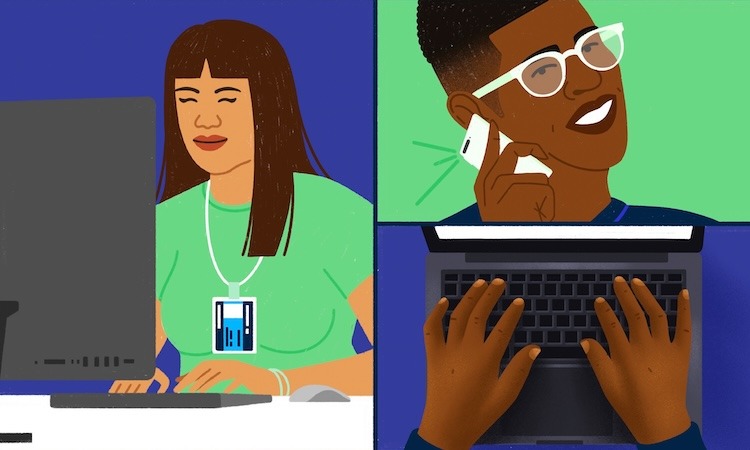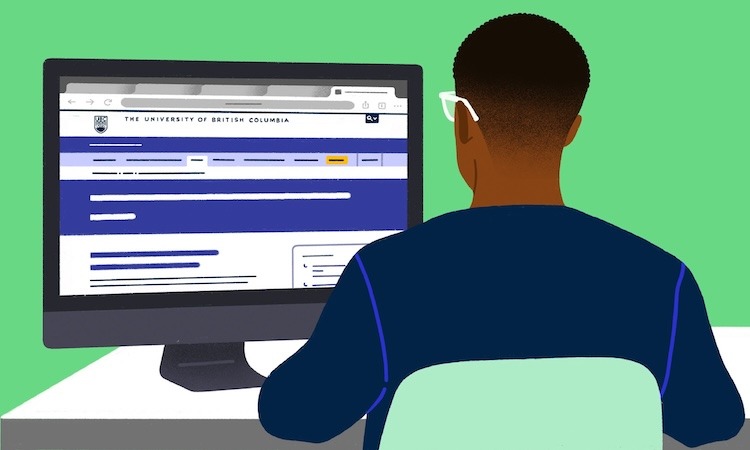Learn about the recent changes.
Embedded counselling appointments in individual faculties or programs will not change.
About the service
Counselling Services is the first point of contact for all of your mental health concerns, whether you would like to see a doctor, a counsellor, or get more information about mental health care at UBC and beyond. We offer virtual, phone, and in-person appointments.
Students seek mental health support for many different reasons:
- You may be feeling anxious, depressed, overwhelmed, or notice that your mental health is declining.
- You may need some help with decision-making, navigating family and social relationships, coping with grief and loss, or adjusting to major life transitions.
- You may be coping with cultural adjustment, understanding your gender and sexual identity, navigating experiences of discrimination or sexual violence, and working through their impacts on your mental health and academic goals.
- You may have difficulty with concentration, organization, procrastination or test anxiety.
Whatever you are experiencing, we are here to support and empower you to take the next steps.
Counsellors and health professionals are committed to keeping your personal information completely private and confidential. Information about you and your health can only be shared with your permission, or when safety concerns or legal requirements arise. If you have any questions about confidentiality, or anything else, please ask during your appointment.
At UBC Counselling Services, we respect that students have unique identities, personalities, cultures, and lived experiences. We strive to bring a culturally responsive, anti-oppressive, and social justice orientation to the counselling process.
Counsellors at UBC Counselling Services represent a broad diversity of identity and human experience. We value and respectfully recognize Indigenous history, culture, traditional values, stories, and the lands we work on. Meet the Counselling Services team.
Counselling Services also offers training through doctoral internship and practicum placements for students in Counselling Psychology graduate training programs.
Mental health crisis support
If you or someone else is in immediate danger, or at risk of harming yourself or others, you can get immediate help in one of the following ways:
- Call or chat online with a crisis line.
- Visit your nearest emergency room at your nearest hospital.
- Call 911.
If you’re a Vancouver resident, you can connect with the Access and Assessment Centre between 7:30 am and 9:30 pm for walk-in services, or call between 7:30 am and 10:00 pm. If you live outside of Vancouver but in British Columbia, you can visit a Rapid Access Clinic in your area.
If you’ve been impacted by a significant event or unanticipated circumstances, there are services and resources to help you.
Contact information
- Phone: 604 822 3811
- Address: Level 3, Gateway building (5955 University Boulevard)
Opening hours
Counselling Services is closed on all statutory holidays observed by UBC.
- Monday: 8:00 am to 5:00 pm
- Tuesday: 8:00 am to 5:00 pm
- Wednesday: 8:00 am to 6:00 pm
- Thursday: 8:00 am to 5:00 pm
- Friday: 8:00 am to 5:00 pm
How to book an appointment
Book by phone
Call 604 822 3811 to schedule a virtual or in-person appointment, offered Monday to Saturday.
First-time appointments are booked for the same day and arranged on a first-come, first-served basis.
Visit in person
Drop by the Student Health and Wellbeing Welcome Desk located on Level 3 of the Gateway Building at 5955 University Boulevard. Our Care Support team can help you set up an appointment based on your needs.

What to expect for your appointment
When you book your first appointment, you’ll be asked to choose one of two appointment types with a mental health professional:
- Single Session Appointment
- Wellness Advising Appointment
Single Session Appointment
A single session appointment is a good option if you’re looking for one-time conversation focused on a specific concern. For example, you might want support with coping skills, decision-making, or guidance on handling a particular issue you’re facing right now.
Wellness Advising Appointment
This appointment type is recommended if you feel you need more support, want to explore a wider range of options, or are considering medical treatments as part of your care.
You’ll meet with a certified mental health professional who will listen to your concerns, help you identify your goals, and collaborate on a plan of mental health care that’s best for you.
During a Wellness Advising appointment, counsellors can also help you navigate the wide range of support available and connect you to self-directed resources, workshops, individual and group counselling, and medical treatment.

Additional resources
Meet a counsellor in your faculty
You may wish to connect with the embedded counsellor in your faculty. In addition to being able to offer support for your mental health concerns, embedded counsellors have a unique perspective on the common issues students in your specific program may experience.
Group Counselling
Browse group counselling programs to connect with other students and learn new skills in a confidential, staff-facilitated setting.
Indigenous Mental Health and Wellbeing program
If you self-identify as an Indigenous student, you can access counselling and community resources through the IMHW program. Program staff also offer mentorship or planning sessions to help students navigate challenges while attending UBC.
Queer and Gender Affirming Counselling program
Counselling Services offers specialized support for 2SLGBTQIA+ students through individual and group counselling.
If you are seeking services for concerns regarding your gender identity or sexual orientation, or prefer to speak with a queer or trans counsellor, you can book an appointment directly. You may also speak with a Wellness Advisor about this specialized service during your intake appointment.
AMS/GSS student health benefits
If you are registered with the AMS/GSS Health and Dental plan, you have up to 100% coverage of the cost towards psychotherapy services from a licensed psychologist, registered clinical counsellor, or a therapist with a Master’s degree in Social Work. Learn how to find a private mental health professional for your concerns.
24/7 Support
- Here2Talk
Call, chat online, or use the mobile app to get free, immediate, 24/7 mental health counselling, available in various languages for post-secondary students in British Columbia. UBC students can reach out as often as needed, anytime, from anywhere in the world. - Crisis Centre BC
If you or someone you know is feeling hopeless or at risk of harm, call or chat online with a crisis responder any time. - First Nations and Inuit Hope for Wellness Help Line
Receive online and phone counselling and crisis support.
Online self-help tools
- Therapy Assistance Online (TAO)
Manage your well-being with tools on stress, relationship problems, substance use, and more. Register with a UBC email, which you can set up for free. - MindHealth BC
Take an online assessment and find resources to support your mental health.




